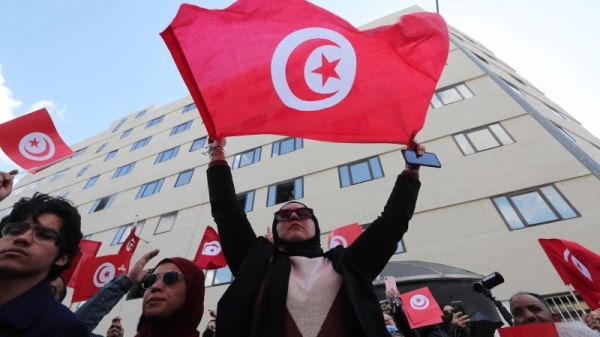EU expresses ‘great concern’ over arrest of Tunisia’s opposition leader

The EU has expressed great concern about Tunisia’s rapidly deteriorating political situation following the arrest of opposition leader Rached Ghannouchi, whose party headquarters have since been shut down.
President Kais Saied, elected in 2019, seized most powers in 2021 by shutting down the elected parliament and replacing the government before moving to rule by decree and rewriting the constitution.
“We are following with great concern the latest developments in Tunisia, in particular the arrest last night of Mr Rached Ghannouchi as well as the information concerning the closure of the headquarters of the Ennahda party in Tunis,” Nabila Massrali, EU spokesperson for foreign affairs and security policy, said in a statement on Tuesday (18 April).
The 81-year-old Ghannouchi was arrested and taken for interrogation by Tunisia’s security services on Monday night. The following day, officials from the Islamist Ennahda party, the main opposition group in Tunisia, confirmed that security forces had closed their offices.
“While awaiting official information on the reasons for this arrest, we recall the importance of respecting the rights of the defence as well as the right to a fair trial,” said Massrali.
“We also underline the fundamental principle of political pluralism,” she said. “These elements are essential for any democracy and form the basis of the European Union’s partnership with Tunisia.”
The Tunisian government is yet to comment on the arrest.
The comments are the EU executive’s most critical of Saïed’s increasingly autocratic regime since the president sacked the government, suspended parliament, and began ruling by decree in July 2021.
However, the Commission has continued to provide significant budget support to Saied’s government, which is currently under pressure to finalise a $1.9 billion bailout programme with the International Monetary Fund. The EU has urged Saied to agree to an IMF deal.
In recent weeks, EU leaders have also signalled that Tunisia will be among the first group of North African states with which the bloc will negotiate new agreements to provide EU financial support in exchange for border control to prevent migration.
Saïed has promised to crack down on what he calls “the enemies of Tunisia”, and the security services have arrested and imprisoned a growing number of opposition politicians, including Noureddine Bhiri, a senior official in the Islamist Ennahda party, and the influential activist Khayam Turki.
Leaders from the National Salvation Front and other political activists have also been jailed, with leaders of the powerful Union Générale Tunisienne du Travail (UGTT) also targeted.
On 9 April, hundreds of opposition supporters gathered in Tunis, demanding the release of political prisoners and a ‘national dialogue’ to draw up a plan to return Tunisia to democratic governance.
Parliamentary elections in December and January, boycotted by the opposition parties following constitutional reforms that removed the assembly’s lawmaking powers, saw turnout fall to around 10%.
Meanwhile, Saied’s dwindling public support has prompted speculation about whether he will seek a second term at elections due in October 2024.



